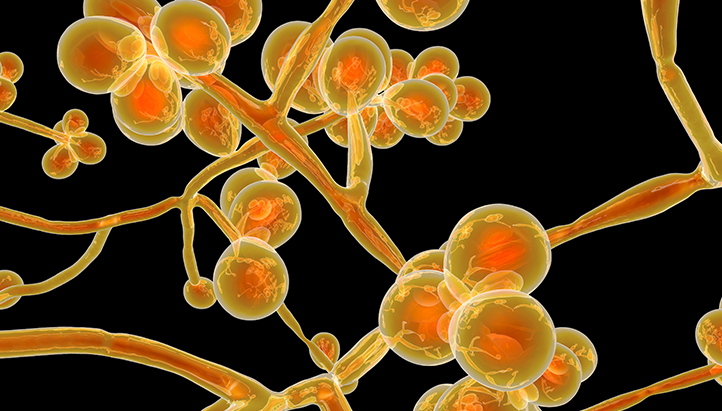LA BioMed Scientists Developing a Vaccine to Protect Against Deadly Superbug
Groundbreaking experiments have immunized mice against the infection caused by Candida auris.

LOS ANGELES — Researchers from the Los Angeles Biomedical Research Institute (LA BioMed) have taken a major step toward the creation of vaccine that could neutralize the culprit behind a growing public health crisis. Candida auris, a “superbug” that has caused hundreds of often fatal hospital-acquired infections in the United States in recent years, is resistant to common antifungal drugs. Almost half of those who contract C. auris die within the first three months, according to the Centers for Disease Control and Prevention.
In a paper published August 5 in the PLoS Pathogens Journal, a team of scientists including Drs. Ashraf Ibrahim and Jack Edwards of LA BioMed detailed recent breakthrough experiments that successfully immunized mice against C. auris infection. The first-of-their-kind experiments can serve as a blueprint for the development of a vaccine that could prevent infections caused by C. auris in humans.
Drs. Ibrahim, Edwards and their team performed studies that identified the presence of proteins in C. auris similar to a major protein in another fungus, Candida albicans, called Als3. In conjunction with LA BioMed spinoff company NovaDigm Therapeutics, they developed a vaccine, NDV-3A, based on certain characteristics of the Als3 protein that they used to successfully immunize mice against C. auris infection.
The vaccine induced significant levels of immune responses and protected immunosuppressed mice from lethal C. auris infection compared with a control group not given the vaccine. Given that C. auris can be resistant to almost all anti-fungal drugs, a vaccine is likely the best way to combat this emerging and deadly pathogen.
“The potential for a vaccine for a drug-resistant fungus like C. auris can save both thousands of lives and billions of dollars in health care costs,” Ibrahim said.
C. auris was first identified in Japan in 2009, according to the New York Times, and has increasingly been detected around the world, often in hospitals and other settings with immunocompromised people. There had been nearly 600 cases in the U.S. as of April 2019, many in the New York-New Jersey metropolitan area, the New York Times reported.
The spread of C. auris-caused infections has continued across the country, with more than 100 cases in Orange County, Calif. as well as one in Los Angeles County that originated in neighboring Orange County, according to LA BioMed researchers. The rapid expansion of this deadly disease—which Connecticut’s deputy state epidemiologist told the New York Times is one of the top threats among drug-resistant infections—only underscores how important it is to develop a vaccine and bring it to market in a timely fashion. The successful experiments conducted by Drs. Ibrahim and Edwards are a monumental first step.
Throughout its 67-year history, LA BioMed has been responsible for countless innovations, including the creation of the nurse practitioner model for women’s healthcare, as well as the introduction of paramedic training. A superbug vaccine would be a major milestone in fighting infectious diseases—and another major life-saving discovery for the institute.
“We are proud that our investigators are continuing our tradition of discoveries that will save many lives,” said David Meyer, PhD, President and CEO, LA BioMed. “Hospital-acquired infections are a growing problem affecting those least able to fight them. This type of highly impactful—and successful— research is what our institute is all about.”
Here is a link to the study: https://journals.plos.org/plospathogens/article?id=10.1371/journal.ppat.1007460
